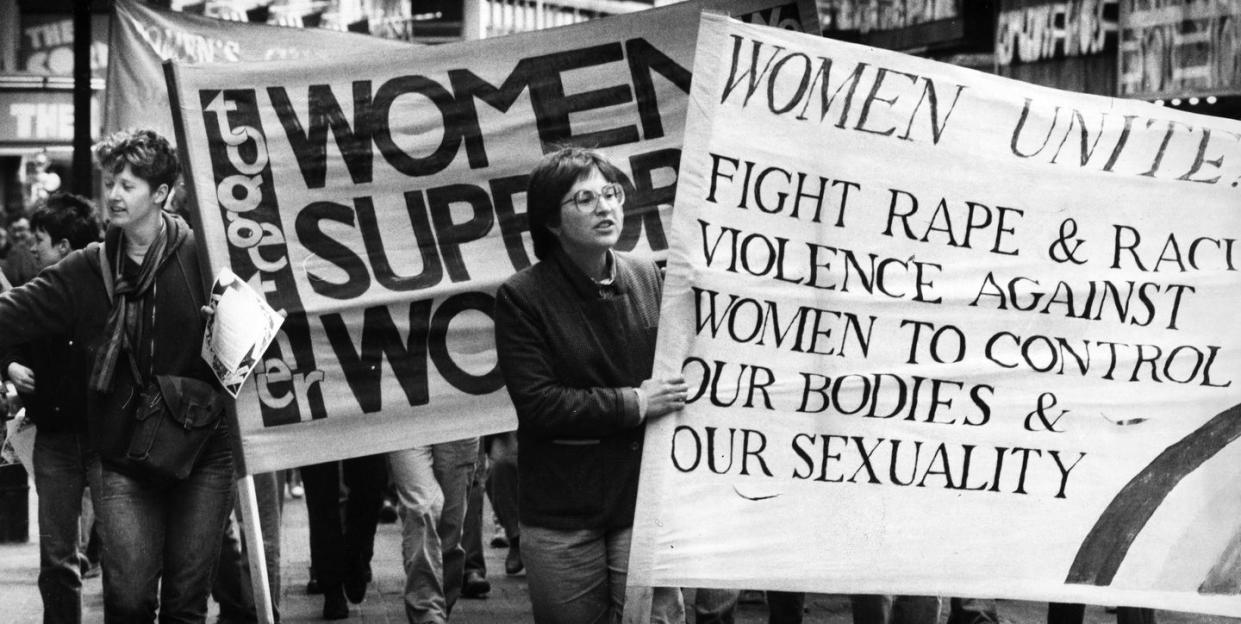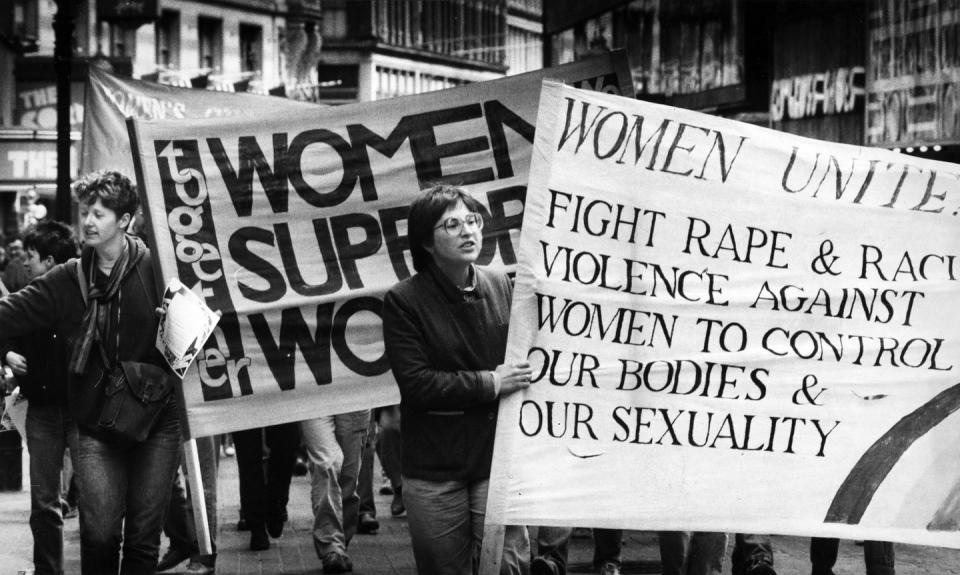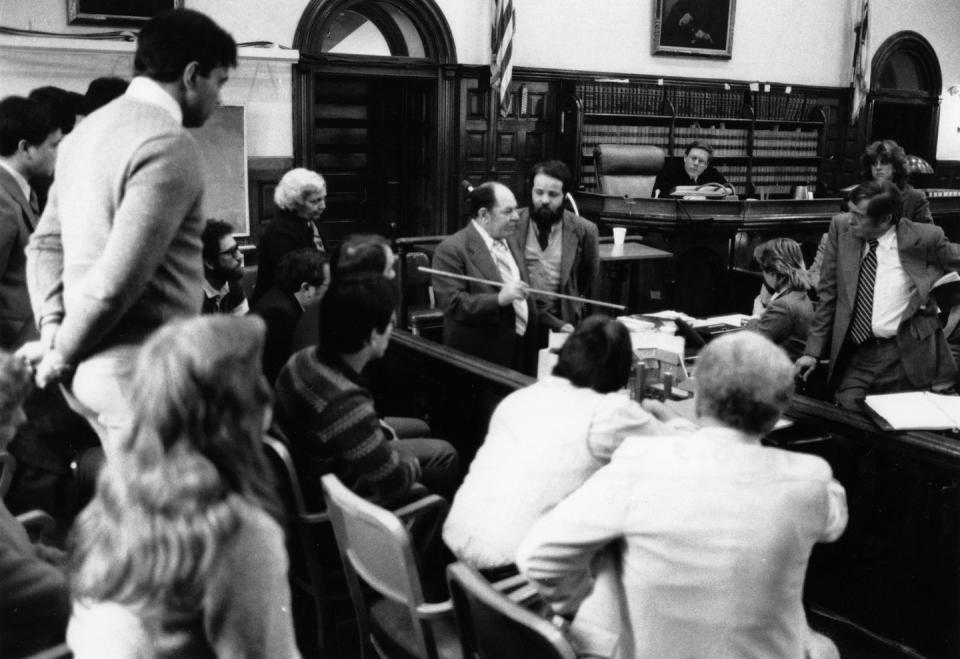Cheryl Araujo's Sexual Assault, Revisited in Netflix's 'Trial By Media,' Put Victim Blaming in the Spotlight


Over the last few years, Americans have grappled with the new awareness of the pervasiveness of sexual abuse and the many ways in which survivors who alert authorities or go public with their accounts can be revictimized. But it’s not the first time that high-profile rape cases have altered the nation’s understanding of assault. Long before the Brock Turner and Harvey Weinstein trials, the trial of Cheryl Araujo’s rapists, the first court case of its kind to be televised, became national news. Now, the story has been re-examined in Netflix’s true crime anthology Trial By Media. Here’s what you should know.
Cheryl Araujo was the victim of one of the most publicized sexual assaults of the 1980s.
In 1983, Cheryl Araujo was a 21-year-old mother of two living in her hometown of New Bedford, Massachusetts. On March 6th, she went into Big Dan’s Tavern to buy cigarettes from a dispenser inside the bar. After chatting with a waitress and ordering a drink, Araujo was attempting to leave the bar when a man grabbed her from behind. She was gang raped on the bar’s pool table while others looked on. One man admitted during the trial that he shouted, “Go for it! Go for it!” during the assault. After more than two hours, Araujo managed to escape, and ran half naked into the street where she flagged down a car carrying three three men, including brothers Dan and Michael O’Neill.

“I was slouched against the window when my brother saw this girl run out of the bar and run up the street. He shouted to us, ‘Naked girl in street, naked girl in street,’” Dan O’Neill told The Herald News in 2009. “I thought to myself, yeah right. But there she was, standing in front of the truck, like a deer in the headlights.” Some of Araujo’s assailants followed her out of the bar, but retreated after seeing the men, who called the police.
Later that month, four men, John Cordeiro, Daniel Silva, and Victor Raposo, Joseph Vieira were charged with assaulting Araujo. Two others who were in the bar that night, Jose Medeiros and Virgilio Medeiros (who aren’t related) were charged with being accessories to the assault. They were accused of cheering the rape and preventing the bartender from intervening. The four accused of assaulting Araujo were convicted at trial in March 1984 and sentenced to serve between 6 and 12 years in prison. The Medeiros were acquitted.
Members of the public vilified Araujo.
The trial was notable for being the first rape case to be adjudicated before live television cameras, and while the cameras weren’t permitted to capture the victim’s face, her name and address were aired. For a month, the trial was broadcast on CNN for up to three hours a day. Viewers heard graphic descriptions of her assault, as well as the victim-blaming cross examination she was subjected to. An attorney for one of the accused men insisted Araujo had consented, and that “one thing led to another.” Defense lawyer Edward Harrington asked her, “If you’re living with a man, what are you doing running around the streets getting raped?”

News reports of the assault brought national attention to the Massachusetts city. The assailants, like 60 percent of New Bedford’s population, were Portuguese-American, and some of the coverage took on xenophobic overtones, blaming Portuguese community as a whole for the crime. Hustler magazine ran a fake postcard featuring a naked woman on a pool table with the caption, “Greetings from New Bedford, Massachusetts, the Portuguese Gang-Rape Capital of America.”
New Bedford rallied against the slurs targeting their community, but some turned to attacking the victim and supporting the accused rapists. Community members raised around $20,000, and bailed four of the men out of prison. Between 7,000 and 10,000 people later marched in protest of the convictions.
“She should have been home in the first place,'' one of the supporters of the accusers shouted outside of the court house, while another said Araujo should be hanged.
The condemnation of her community left Araujo “living in fear,” her attorney told the New York Times after the trial.
Araujo continued to be harassed after the trial.
One listener called into a local radio show to declare that Aruja was “dead meat.” Another woman told the local news that she “ should get punished, too. If they raped her, she was the aggravator. I'm sorry to say it but I think it was her."
Over 16,000 people signed petitions requesting leniency for the convicted men. After the trial, both Araujo and her sister moved to Miami due to the harassment they received. Even the O’Neills, who helped Araujo in the aftermath of the assault, received death threats for aiding the victim and testifying for the prosecution. None of Araujo's assailants served more than six and a half years in prison.

The attack inspired the 1988 film The Accused. Jodie Foster played a character based on Araujo, and won the Best Actress Academy Award for her portrayal. By then, the real Cheryl Araujo had already died. In December 1986, at the age of 25, Araujo crashed her car. Her two daughters suffered minor injuries, but Araujo, who was intoxicated at the time of the accident, died. Araujo had struggled with alcoholism in the years after the rape, and spent more than six months of the year before her death in rehab.
In 1984, the Senate held a hearing examining the effects of allowing the New Bedford trial to be aired on television. “Rare is the woman who can endure both the trauma of rape,” said then-Bristol County, Massachusetts district attorney Ronald Pina, “and the trauma of a highly publicized trial.”
You Might Also Like

